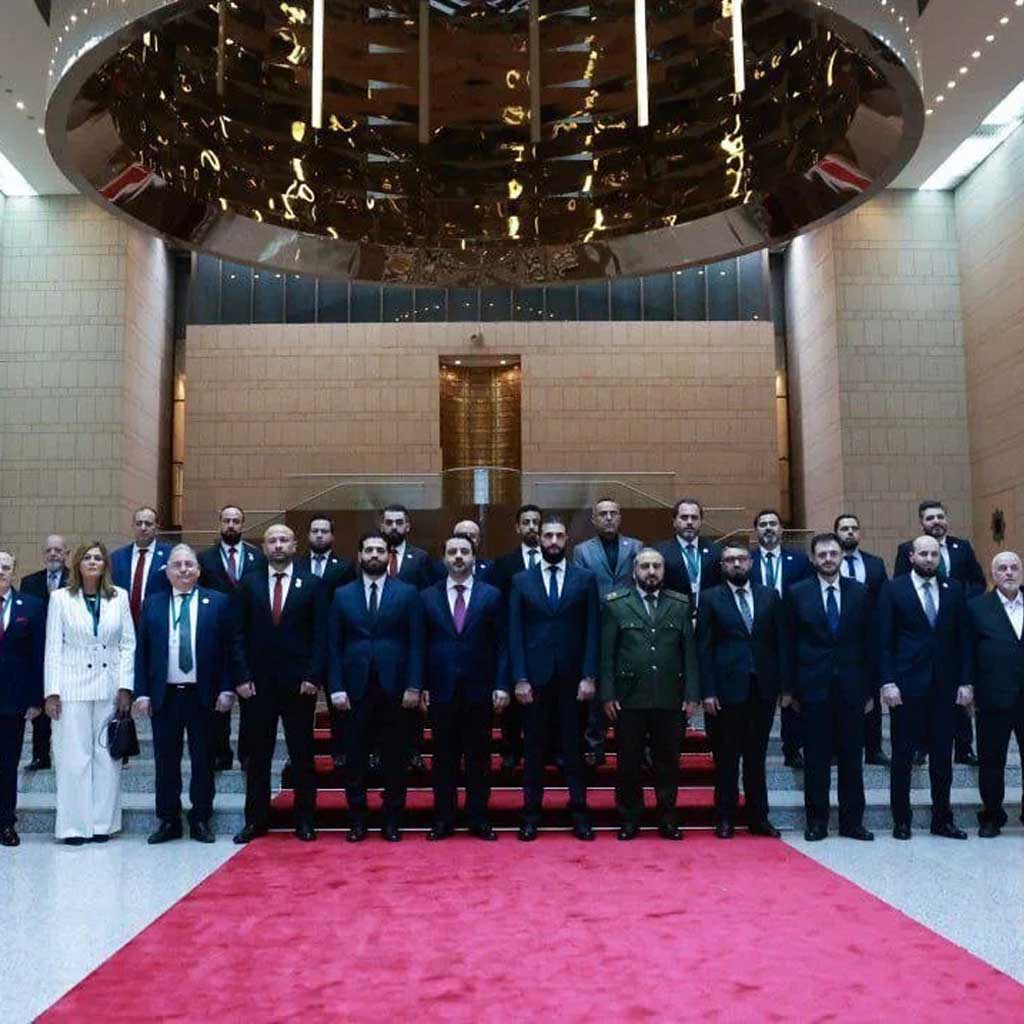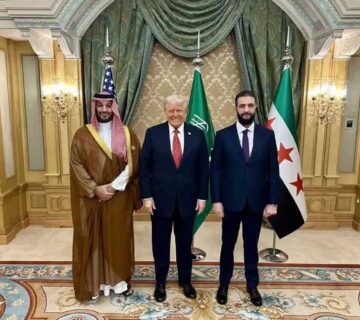A New Dawn for Syria
In a defining historical moment, Syria turned the page on a painful past with the fall of the Bashar al-Assad regime in December 2024, ushering in a new era carrying high hopes for a different future. The announcement by the transitional president, Ahmed al-Shar’a, of the formation of the “Government of Change and Construction” in late March 2025 represented the first executive step towards realizing these hopes on the ground.
The announcement was not merely a change in names and portfolios, but, as President al-Shar’a described it, “a declaration of our shared will to build a new state” – a strong and stable state that prioritizes the interests of the nation and its citizens, based on the principles of transparency and accountability. This government, composed of 22 ministers, is not just an administration for the transitional phase, but the cornerstone of “Syria Vision 2045,” the ambitious vision that aims to rebuild Syria and achieve a comprehensive renaissance that places it among the ranks of developed countries by mid-century.
The Technocratic Approach: Building the State on Expertise and Competence
President Ahmed al-Shar’a repeatedly emphasized that the formation of the new government “avoided quotas and opted for participation,” and that the selection fell upon “those with experience and competence” whose primary concern is “building this country” and achieving “change and improvement.” This orientation towards “technocrats” – that is, relying on experts and specialists in managing state affairs – represents a fundamental shift in Syrian administrative thought and gains double importance in this delicate phase.
Syria today stands before formidable challenges that require practical and scientifically studied solutions, starting with rebuilding what the war destroyed, passing through reviving the collapsed economy and addressing deep social issues, and arriving at restoring the citizen’s trust in state institutions. In this context, relying on competence and specialized expertise, instead of political loyalties or narrow affiliations, becomes an imperative necessity and not merely an option.
Choosing ministers based on their CVs, rich with scientific and practical achievements, whether from inside Syria or from its children abroad – as President al-Shar’a pledged to attract them – sends a strong message that the criterion of competence is the foundation, and that the goal is the supreme national interest. This approach not only contributes to overcoming political divisions and focusing on pressing developmental priorities but also enhances local and international confidence in Syria’s ability to recover and rise, and encourages skilled emigrants to return and contribute to building their homeland.
Engines of Recovery and Development: A Look at the Key Ministries and Ministers
Achieving “Syria Vision 2045” requires tremendous efforts across all sectors. The composition of the new government, with its diverse competencies, reflects a deep understanding of the scale of the challenges and the importance of putting the right person in the right place. Here, we review the most prominent sectors and the ministers who will lead the march of change and construction:
The Economy and Reconstruction Sector: Building the Foundation for the Future
Undoubtedly, rebuilding the economy and rehabilitating infrastructure represent the most pressing priority for Syria today. This complex file requires high-level economic, financial, and engineering expertise, which the new government has sought to provide:
- Ministry of Finance: This sensitive portfolio has been entrusted to Mohammed Yasser Barni, a figure with extensive financial and banking experience. He previously served as Head of Financial Markets at the Arab Monetary Fund and was a founding partner of Cham Bank in Syria. His expertise is expected to contribute to restructuring financial policies, reviewing public debt strategies, reconsidering tax policy to suit the requirements of the new phase, strengthening the national currency, and achieving monetary stability.
- Ministry of Economy: This ministry is headed by Mohammed Nidal al-Shaar, who combines academic experience (a PhD in Economics from Georgetown University) with governmental experience (former Minister of Trade and Economy and Head of the Supreme Council for Investment) and international experience (advisor and expert at international institutions like the World Bank). His vision is relied upon to build a new macroeconomic model, develop the legislative and investment environment to encourage the private sector, rehabilitate industry, protect local products, and secure foreign and local investments by simplifying procedures and providing a safe and attractive environment.
- Ministry of Energy: This sector faces enormous challenges, and Mohammed al-Bashir has been chosen to lead it. With his background as an electrical and electronics engineer (University of Aleppo), his previous experience in the Syrian Gas Company, in addition to his experience as head of the first transitional Syrian government and head of the Salvation Government, al-Bashir possesses a deep understanding of the complexities of the administrative and technical file. The biggest challenge lies in implementing the government’s pledge to reform the energy sector to provide electricity as quickly as possible and around the clock, and to establish new stations that meet the needs of citizens and industry.
- Ministry of Transport: Ya’rub Suleiman Badr, who previously held the same position (2006-2011), returns to lead this ministry. Dr. Badr holds a PhD in Transportation Sciences from Paris and worked as a regional advisor for transport and logistics at ESCWA (United Nations), in addition to his academic experience as a university professor. This extensive experience is expected to rehabilitate and develop transport, communication, and road networks, and link them regionally and internationally to support the movement of trade and individuals.
- Ministry of Agriculture: Amjad Badr, who holds a PhD in Agricultural Economics, is responsible for achieving food security and optimal utilization of resources. His research experience at the General Authority for Agricultural Scientific Research and his participation in international projects qualify him to develop effective strategies to identify available resources, expand agriculture, develop agricultural infrastructure, support strategic crops, and care for farmers.
- Ministry of Public Works and Housing: Civil engineer Mustafa Abdul-Razzaq takes charge of this vital file. His field experience gained from supervising the implementation of dozens of projects and managing projects in northwestern Syria, in addition to his specialization in works and road management, makes him qualified to lead the efforts to rebuild infrastructure and housing, and to establish the necessary support funds for reconstruction efforts.
- Ministry of Tourism: With the aim of transforming Syria into a global tourist destination, Mazen al-Salehani has been chosen to lead the ministry. With his extensive experience in business and project management (Master’s degree from America and a higher diploma from Canada), and his founding and management of a group of companies that contributed to major tourism and hospitality projects in the region and the world, al-Salehani possesses the necessary vision and experience to rehabilitate the tourism sector and attract investments to it.
- Ministry of Communications and Information Technology: Led by technology entrepreneur Abdul Salam Haykal, founder of leading Arabic software and language processing companies, and Chairman of the Board of Directors of “Majarra” (publisher of Harvard Business Review Arabia). His extensive experience in the world of technology and digital media, and his international relations (as a member of the Board of Trustees of the American University of Beirut and the Advisory Council for the Arabic Language in the UAE), qualify him to lead the efforts towards achieving the ambitious goal of transforming Syria into a regional communications hub, establishing a strong digital infrastructure, promoting digital transformation in government services and the economy, and attracting technological investments.
Human and Social Development Sector: Investing in the Syrian People
The new government realizes that building the future is not limited to bricks and mortar, but its foundation is building the human being. Therefore, the human and social development sector receives special attention and is led by highly qualified ministers:
- Ministry of Higher Education: Led by Marwan al-Halabi, a specialized physician with a rich academic and research record (more than 60 published research papers, multiple higher degrees from Syria and France). His extensive experience in the medical and academic fields is expected to develop curricula and scientific research in Syrian universities, raise the level of higher education to keep pace with international standards, and contribute to graduating qualified cadres that serve “Syria Vision 2045.”
- Ministry of Education: Held by Mohammed Turko, who combines academic experience (PhD in Law from Germany, faculty member) with administrative experience (Vice President of Damascus University). His fluency in several languages (Kurdish, German, English) may open horizons for international cooperation in developing primary and secondary education and applying best educational practices.
- Ministry of Health: Entrusted to Musab Nizar al-Ali, a prominent neurosurgeon who gained international experience through his specialization and work in Germany. His background as a distinguished physician and revolutionary activist from Deir ez-Zor gives him a deep understanding of the needs of the exhausted health sector. He is relied upon to implement the plan to rebuild the health system, rehabilitate hospitals, develop medical personnel, and benefit from the expertise of Syrian doctors abroad.
- Ministry of Social Affairs and Labor: Led by Hind Kabawat, a well-known activist in the field of civil society and peacebuilding, and winner of international awards. With her extensive experience working with international (such as the World Bank and Interpeace) and local organizations, her postgraduate studies in law and diplomacy, and her role in the Negotiations Committee, Kabawat possesses a comprehensive vision for addressing complex social issues, empowering women, supporting vulnerable groups, and promoting dialogue and societal reconciliation.
- Ministry of Endowments: Held by Dr. Mohammed Abu al-Khair Shukri, who combines Islamic sciences (Faculty of Da’wa, Master’s and PhD in Islamic Studies) with law (Faculty of Law, Professor of Law). He is expected to manage religious affairs with a moderate vision, enhance the role of the Waqf institution in community development, and focus on shared human values and human rights (as reflected in the title of his doctoral dissertation on children’s rights).
- Ministry of Culture: Led by intellectual and poet Mohammed Yassin Saleh. With his academic background in linguistics and translation (Universities of London and Westminster), his experience in journalism and cultural media, and his literary works, he is expected to enrich the Syrian cultural scene, support creative individuals, enhance the unifying national identity, and build bridges of cultural communication with the world.
Governance and Foreign Relations Sector: Building State Institutions and Restoring Stature
Building a modern state requires strong and effective institutions operating under the rule of law, and balanced foreign relations that serve supreme national interests. The government includes individuals entrusted with achieving these crucial goals:
- Ministry of Interior: Anas Khattab assumes responsibility for this important security ministry, in addition to continuing his presidency of intelligence. This dual assignment indicates the centrality of the security file in the transitional phase. He is expected to work on implementing the government’s pledge to rebuild security institutions in a professional manner that ensures the restoration of security for citizens and combats all threats, with a focus on human rights and the rule of law.
- Ministry of Defense: Murhaf Abu Qusra continues in his position, indicating the continuity of work on implementing the pledge to build a professional national army whose loyalty is to the nation and protecting its borders and constitutional institutions.
- Ministry of Justice: Led by Mazhar al-Wais, who combines the study of medicine and comparative jurisprudence, and carries a harsh experience as a former political prisoner. This unique background may give him a special perspective on the importance of establishing justice, reforming the judicial system, and combating corruption, which are among the most prominent pledges of the new government. His previous experience as head of a Sharia body may also contribute to reconciliation and transitional justice efforts.
- Ministry of Foreign Affairs and Expatriates: Asaad al-Shaibani continues to lead the country’s diplomacy, indicating a desire to maintain relative stability and consistency in managing complex foreign affairs. The stated goal is “to maintain the stability of foreign relations in a way that secures the sustainable interests of Syria and its friends.” Minister al-Shaibani and his team are expected to work on restoring Syria to its natural place in the international community, mobilizing support for the reconstruction process, and caring for the affairs of Syrian expatriates and encouraging their return.
- Ministry of Local Administration and Environment: Held by the young Mohammed Anjarani (born 1992), a mechanical engineer who joined the revolution early and held administrative positions in opposition structures (local administration official, head of a supervisory body, Minister of Local Administration in the Salvation Government). His practical experience in managing local affairs under difficult circumstances, despite his young age, qualifies him to work on building an effective local administration system that grants governorates and regions broader powers, involves citizens in making decisions that affect their lives, and addresses pressing environmental challenges.
- Ministry of Information: Headed by Hamza Mustafa, an academic and media professional (PhD from Britain, former researcher, Director General of Syria TV). He is expected to work on building a new media landscape characterized by professionalism, credibility, and responsible freedom, reflecting the aspirations of Syrians in the post-change phase.
- Ministry of Administrative Development: Held by Mohammed Skaf, who holds a Master’s degree in Management and has experience in managing budgets, human resources, and organizational structures within the Salvation Government structures. He is entrusted with the task of modernizing the state’s administrative apparatus, simplifying procedures, raising employee efficiency, and applying the principles of good governance, in a way that serves the goals of transparency and combating corruption.
Newly Established Ministries and Strategic Focus: Meeting the Needs of the Future
The changes were not limited to faces but included the establishment of new ministries that reflect an awareness of the priorities of the phase and aspirations for the future, and the appointment of ministers with specific expertise in vital areas:
- Ministry of Emergency and Disasters: The establishment of this ministry, led by Raed al-Saleh, founder and director of the internationally renowned “White Helmets” organization, represents an important proactive step. Al-Saleh’s extensive experience in humanitarian response and crisis management, for which he and his team have received widespread international recognition (including nominations for the Nobel Prize and the Oscar Award), will be crucial in building a rapid and effective national response system to face any challenges or natural or man-made disasters, and to ensure the protection of citizens in difficult times.
- Ministry of Sports and Youth: The creation of this ministry, led by Mohammed Sameh Hamid, who previously headed the General Sports Federation and achieved tangible successes, reflects a belief in the pivotal role of youth in building Syria’s future. Minister Hamid is expected to work on developing the sports sector and providing opportunities for youth to develop their skills and contribute effectively to various aspects of public life.
Integrated Efforts Towards “Syria Vision 2045”
Reviewing the backgrounds and experiences of the ministers of the “Government of Change and Construction” reveals a unique blend of academic and professional competencies and administrative experiences gained at home and abroad, whether in the public or private sector, or in opposition structures and civil society organizations. This diversity, if employed in an integrated and coordinated manner, bodes well and constitutes a real driving force towards achieving the ambitious goals of “Syria Vision 2045.”
The Minister of Economy’s experience in attracting investments complements the efforts of the Minister of Public Works in rebuilding infrastructure, the Minister of Energy’s plans to provide electricity, and the Minister of Communications’ vision to build a digital economy. The efforts of the Minister of Social Affairs in empowering society complement the plans of the Ministers of Education and Health to build the human being, and the pursuit of the Minister of Justice to establish the rule of law. The stability of foreign relations, which the Minister of Foreign Affairs is working on, provides a supportive environment for the efforts of the Minister of Tourism, the Minister of Finance, and the rest of the government team.
It is an integrated work system, led by the transitional president, Ahmed al-Shar’a, relying on competence and experience as a fundamental criterion, and setting its sights on a single goal: building the new Syria, democratic Syria, prosperous Syria, Syria 2045.
Cautious Optimism and Hope for the Future
Undoubtedly, the hopes placed on this government are as great as the challenges it faces. The legacy of decades of authoritarianism and years of devastating war cannot be erased by a decision or overnight. The road is long and arduous, requiring continuous work, sacrifices, and patience.
However, forming a government of competencies and technocrats, away from quotas, represents in itself a giant step in the right direction and provides an essential condition for long-awaited success. The presence of appropriate expertise in leadership positions, with the declared commitment to fighting corruption and establishing transparency and accountability, instills cautious but real optimism in hearts.
The biggest bet remains on this government’s ability to translate promises and plans into tangible realities that citizens can feel in their daily lives, and on the extent to which all Syrians, inside and outside the country, come together to support the efforts of construction and change. It is a shared historical responsibility to shape the features of Syria’s bright future, the first glimpses of which have begun to appear on the horizon.



